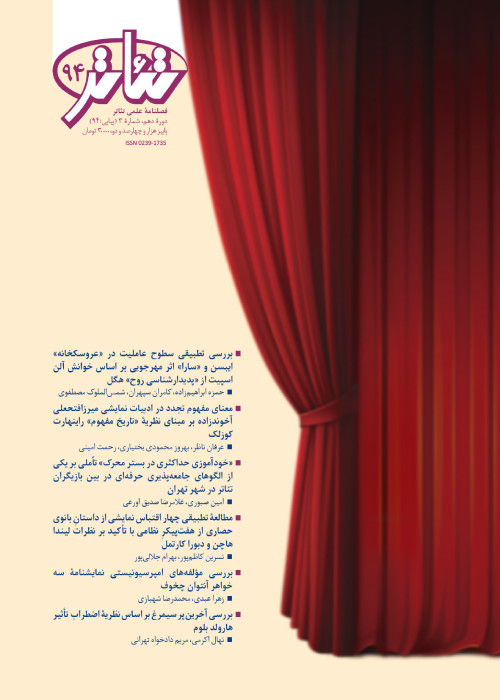Cultural parameters transition in adaptation from play for film script with emphasis on film, TARDID made by Varoujh Karimmasihi
Author(s):
Abstract:
From the past, the adaptation of classic salient works has always been one of the main ways of creating new art works. Adaptation from a source culture to a destination one also is a kind of intercultural dialogue which as we see it is a very important issue of our era. So it is obvious that doing reserches and analysis on any aspect of this matter could be useful and on the other hand we can statistically claim that most of the researches and articles done on adaptation are consentrated on adaptation technics and methods and not on its cultural aspects. In the process of adaptation some changes and adjustments are necessary to be carried out from the original work to the target one. Most of these adjustments will be formed in transition from the temporal-spatial culture of the original work to the temporal-spatial culture of the target work. The art work as a structure which is made in its own cultural environment has some materials which may differ from one culture to another, i.e. the artist who adapts according to the culture in which he lives has access to some new basic materials by which he has to rebuild the original work. The word “Culture” is a main term in human studies, which has been determined and described in different times and various analytical schools in different ways. In a major categorization we can categorize these methods in two types, “Descriptive” and “Parametrical” definitions. Clearly we should use the parametrical definitions in this paper. And after studying different parametrical analysis and editing them and omitting the repetitive ones we will have these parameters as the main parameters of a culture: language, science, religion, law, politics, gender relationships, marriage, moralities, habits, beliefs, arts, etc. Because of the article limitations four items were chosen among these parameters:Science, Religion, power relationships and gender relationships. The subject of this paper is to find out which materials are available in each culture to build a new structure (here the new art work). Are these materials the same in all cultures? Could some of these materials be seen as equivalent to some others in another culture? Is it basically possible to transit these essential parameters in two different cultures? Doing so, the first part has been assigned the exploration of the notions of culture and its constituents. Other parts regarding the selected case studies (Shakespeare’s play: Hamlet, Varujh Karim Masihi’s movie: Tardid (doubt)) have been devoted to the survey of cultural parameters of Shakespear’s era in Britain and Iran accordingly. As it was noted above these surveys have been carried out from four different perspectives: Science, Religion, power relationships and gender relationships. In next part the selected case studies have been scrutinized according to the findings of the past chapters and the primary results indicate the importance of conforming the cultural parameters in adaptation so that if the conformity is not achieved the result of adaptation would not be as effective as the original work or more likely it would eliminate its artistic values.
Keywords:
Language:
Persian
Published:
Theater, Volume:1 Issue: 54, 2014
Page:
77
magiran.com/p1301695
دانلود و مطالعه متن این مقاله با یکی از روشهای زیر امکان پذیر است:
اشتراک شخصی
با عضویت و پرداخت آنلاین حق اشتراک یکساله به مبلغ 1,390,000ريال میتوانید 70 عنوان مطلب دانلود کنید!
اشتراک سازمانی
به کتابخانه دانشگاه یا محل کار خود پیشنهاد کنید تا اشتراک سازمانی این پایگاه را برای دسترسی نامحدود همه کاربران به متن مطالب تهیه نمایند!
توجه!
- حق عضویت دریافتی صرف حمایت از نشریات عضو و نگهداری، تکمیل و توسعه مگیران میشود.
- پرداخت حق اشتراک و دانلود مقالات اجازه بازنشر آن در سایر رسانههای چاپی و دیجیتال را به کاربر نمیدهد.
In order to view content subscription is required
Personal subscription
Subscribe magiran.com for 70 € euros via PayPal and download 70 articles during a year.
Organization subscription
Please contact us to subscribe your university or library for unlimited access!


